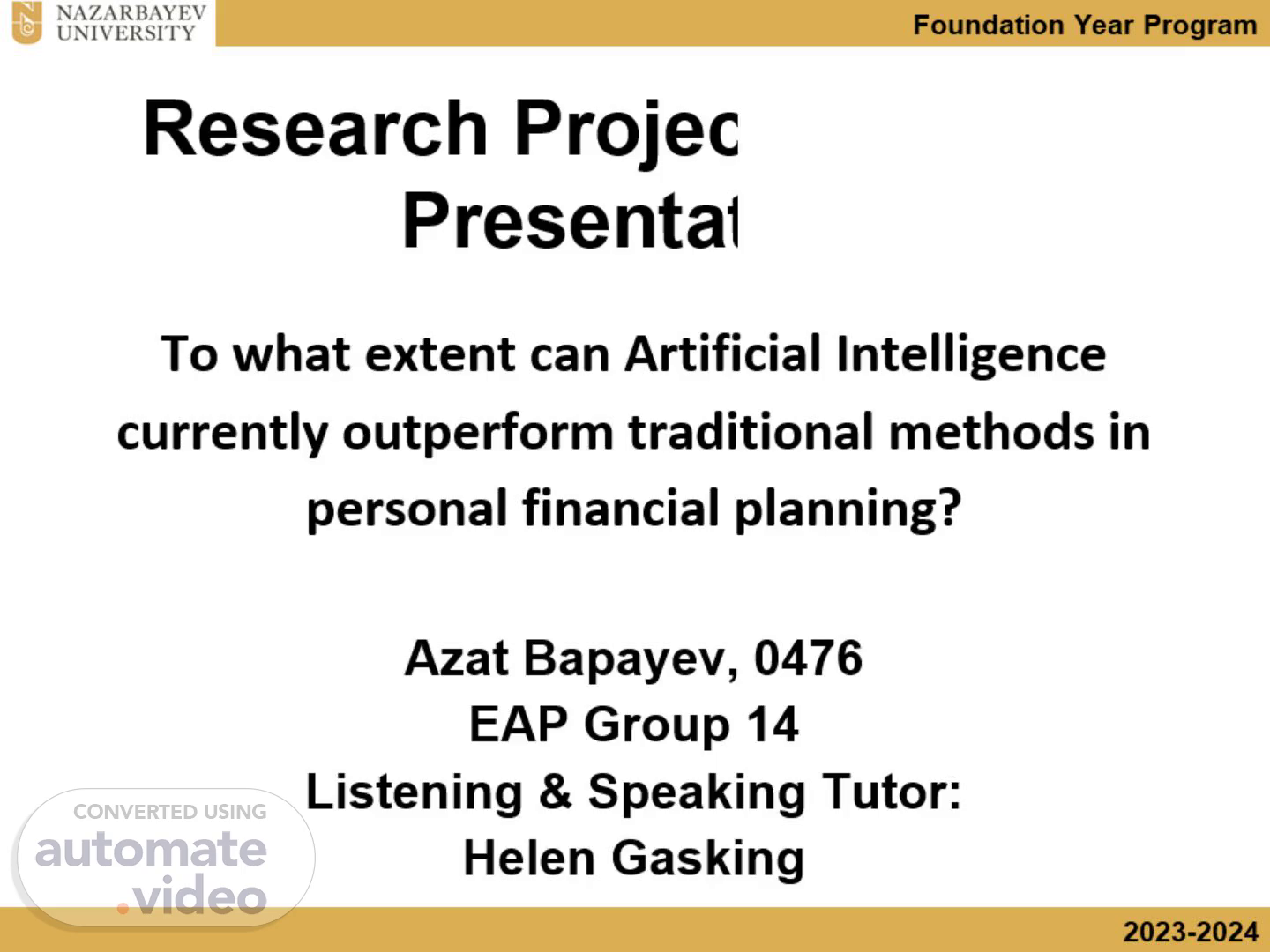
Research Project Proposal Presentation
Scene 1 (0s)
Research Project Proposal Presentation. To what extent can Artificial Intelligence currently outperform traditional methods in personal financial planning? Azat Bapayev, 0476 EAP Group 14 Listening & Speaking Tutor: Helen Gasking.
Scene 2 (11s)
Research Project Proposal Presentation. Introduction: Aim: To explore and compare financial robo-advisors and traditional methods. Why choose this topic? Why this topic? The finance sector is leading in adopting cutting-edge technologies, especially investing in robo-advisors, an AI trend with profound implications for daily life and the future of money (Bughin et al., 2017)..
Scene 3 (29s)
Research Project Proposal Presentation. Overview: Thesis Statement Three main arguments. Managerial fees Judgment bias Trust Annotated sources Conclusion and questions.
Scene 4 (39s)
Research Project Proposal Presentation. Thesis: Given robo-advisors' lower fees, 24/7 accessibility, and a lack of judgment bias, Artificial Intelligence emerges as a cost-effective and unbiased force in personal financial planning. However, trust remains a challenge for AI as clients value the personal connection and nuanced judgment of human advisors, which fosters reassurance in interpersonal relationships..
Scene 5 (57s)
Research Project Proposal Presentation. Managerial Fees Robo-advisors are more affordable than traditional human advisory services. Evidence: Robo-advisors: 24/7 financial access, lower cost than traditional human advisory services (Faubion, 2016; Park et al., 2016, as cited in Belanche et al., 2019). Robo-advisors offer advantages like instant access, time efficiency, and lower fees than human financial advisors (Fisch et al., 2018)..
Scene 6 (1m 18s)
Research Project Proposal Presentation. Judgment bias Robo-advisors lack judgment bias, unlike emotional biases seen in human advisors. Evidence: Robo-advising minimizes human error and bias, enhancing forecasting accuracy (Jung et al., 2018, as cited in Zhang et al., 2021). Overconfident individuals, influenced by optimism, tend to take excessive financial risks (Tversky & Kahneman, 1974, cited in Seppälä, 2009)..
Scene 7 (1m 37s)
Research Project Proposal Presentation. Trust Robo advisors are perceived as less trustworthy compared to traditional methods. Evidence: Customer trust is challenging for robo-advisors due to features like high investment risk and online transactions (Greiner, 2007, cited in Guo et al., 2019). AI-based SST can't build social rapport with consumers (Bock et al., 2020)..
Scene 8 (1m 55s)
Research Project Proposal Presentation Annotated Sources.
Scene 9 (2m 37s)
Research Project Proposal Presentation. Conclusion Position: I support AI robo-advisors and believe that in the near future, Artificial Intelligence will outperform human financial advisors. Summary: Adoption is found to be mostly determined by consumers' opinions about robo-advisors, mass media, and interpersonal subjective standards..
Scene 10 (2m 53s)
Research Project Proposal Presentation. References: Bughin, J., Hazan, E., Sree Ramaswamy, P., DC, W., & Chu, M. (2017). Artificial intelligence the next digital frontier. Belanche, D., Casaló, L. V., & Flavián, C. (2019). Artificial Intelligence in FinTech: understanding robo-advisors adoption among customers. Industrial Management & Data Systems, 119(7), 1411-1430. https://doi.org/10.1108/IMDS-08-2018-0368 Fisch, J. E., Laboure, M., & Turner, J. A. (2019). The Emergence of the Robo-advisor. The Disruptive Impact of FinTech on Retirement Systems, 13. Zhang, L., Pentina, I., & Fan, Y. (2021). Who do you choose? Comparing perceptions of human vs robo-advisor in the context of financial services. Journal of Services Marketing, 35(5), 634-646. https://doi.org/10.1108/JSM-05-2020-0162 Seppälä, A. (2009). Behavioral biases of investment advisors-The effect of overconfidence and hindsight bias. http://urn.fi/URN:NBN:fi:aalto-201111181194 Guo, F., Cheng, X., & Zhang, Y. (2019). A conceptual model of trust influencing factors in robo-advisor products: A qualitative study. https://aisel.aisnet.org/whiceb2019/48 Bock, D. E., Wolter, J. S., & Ferrell, O. C. (2020). Artificial intelligence: disrupting what we know about services. Journal of Services Marketing, 34(3), 317-334. https://doi.org/10.1108/JSM-01-2019-0047.